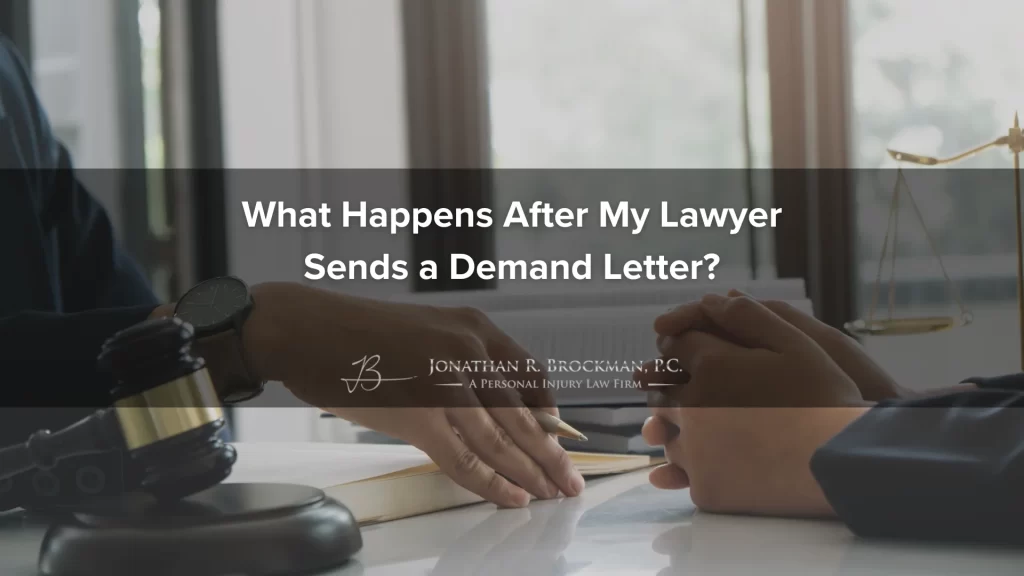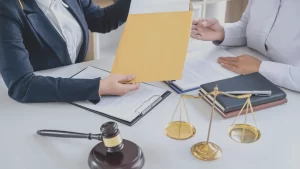Posted on Friday, September 1st, 2023 at 9:00 am

Sending a demand letter is a significant step in many legal disputes. But if you’re uncertain about what comes next, you’re not alone. Here’s what you need to know about preparing a demand letter and what to expect after your lawyer sends it to the other party.
What Is a Demand Letter?
A demand letter is a formal, written document that one party, often through their attorney, sends to another party requesting specific actions or remedies. In a personal injury case, it’s often a preliminary step the claimant takes to resolve a matter before resorting to a lawsuit.
Demand letters outline the sender’s claim or right, the basis for their claim, and the specific relief or resolution they seek. This could be a sum of money, an action, or even an acknowledgment. Receiving a demand letter often encourages the recipient to engage in negotiations so they can avoid costly and time-consuming court proceedings.
What Information Does a Demand Letter Contain?
A good demand letter leaves no room for interpretation. When your lawyer prepares a demand letter for your case, they will include certain elements to ensure its effectiveness, such as:
- Your details, including your name, address, and contact information
- The recipient’s details
- The date of the letter’s preparation
- Reference or case numbers, if applicable
- A description of the dispute or incident
- The factual basis for your claim
- The specific relief or action requested
- The deadline for the desired response
- Any applicable laws or contracts supporting the claim
- Evidence or documentation (e.g., attachments and references)
- Proposed settlement or resolution terms
- A notice of intent to pursue legal action if your demands aren’t met
- Your signature or your lawyer’s signature
Why You Should Work with a Lawyer to Send a Demand Letter
Having a lawyer craft and send a demand letter on your behalf offers several distinct advantages.
First, legal professionals have experience framing demand letters to clearly articulate your claims and rights without overlooking any essential details. They’re adept at citing relevant laws or contractual terms that bolster your position.
Second, a demand letter coming from an attorney underscores the seriousness of your claim. It signals to the recipient that you’re prepared to escalate the matter by going to court if necessary. This can encourage a swifter and more thoughtful response.
Finally, an attorney can guide you on the potential consequences and responses the letter might evoke. They can prepare you for subsequent steps based on how the other side responds and adjust your legal strategy accordingly as your case progresses.
How Soon After Sending a Demand Letter Should You Expect a Response?
 When you send a demand letter, the timeframe for a response largely depends on the deadline you stipulated within the letter. Many demand letters give recipients up to 30 days to reply. However, the response time can vary based on the nature of the claim or the complexity of the issue at hand. It’s best to wait until the deadline passes before taking further action. Factors like mail delivery time and the recipient’s schedule might also influence when you receive their reply.
When you send a demand letter, the timeframe for a response largely depends on the deadline you stipulated within the letter. Many demand letters give recipients up to 30 days to reply. However, the response time can vary based on the nature of the claim or the complexity of the issue at hand. It’s best to wait until the deadline passes before taking further action. Factors like mail delivery time and the recipient’s schedule might also influence when you receive their reply.
What Are the Possible Outcomes After Sending a Demand Letter?
Several outcomes are possible after sending a demand letter. Depending on the circumstances, the recipient might respond with:
- Agreement: In some cases, the recipient acknowledges the validity of your claim and agrees to the terms you outlined. This can lead to a swift and amicable resolution, often signaling the recipient’s desire to avoid protracted disputes or legal complications.
- Negotiation: Not all recipients will fully agree with the demands you present. Instead, they might contest certain aspects and propose alternative solutions or terms. This opens the door for negotiations, wherein both parties aim to find an acceptable middle ground.
- Disregard: Some recipients might choose not to respond due to oversight or because they doubt you truly intend to take the matter to court. In other instances, the recipient might outright dismiss the claim without a counterargument, hoping to deter you from further action.
- Litigation: Recognizing the severity of the claim, the recipient might enlist their own legal counsel. This could result in a more formal response, clarifying their position and laying the groundwork for their legal defense.
Talk to a Personal Injury Lawyer Today
If you know or suspect you have a personal injury case, you deserve professional legal support as you assess your options. The Georgia personal injury lawyers of Jonathan R. Brockman, P.C. can provide that support. Call us today at (770) 205-8827 for a free consultation to learn how we can make a difference in your case.
Related Posts
